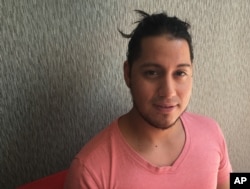The Obama-era program that protects young immigrants from deportation and that President Donald Trump has tried to end is likely to remain in effect through most of this year. The U.S. Supreme Court did not add it to its docket.
Meanwhile, the fate of the Deferred Action for Childhood Arrivals (DACA) program lies with 11 cases all over the country.
"So, all in all, there's 11 cases that are pending right now because they're kind of grouped based on where they were filed. Most of the time, you'll just hear people talking about them as five," Joshua Rosenthal, staff attorney at the National Immigration Law Center, told VOA.
Among these five groups of cases, two courts have halted the government's termination of DACA and allowed DACA recipients to renew their benefits. Another has ordered the government to follow its own 2012 policy and protect DACA recipients' private information, which might be used to start deportation proceedings. A fourth court has twice ordered the government to reinstate DACA in its entirety, going beyond letting DACA recipients renew to allowing new people to apply.
A fifth court — the one widely expected to shoot down the program — declined to issue an injunction that would have stopped DACA renewals while the case was being adjudicated.
The Trump administration announced the end of DACA in September 2017. The government argued the program was established "without proper statutory authority."
Under that plan, DACA would have been phased out starting in March 2018. But the courts have kept the program going at least until it has its full day in five different courts.
Vidal v. Trump
A three-judge panel of the 2nd Circuit Court of Appeals in New York — the next step up from the courts that have already ruled in the various cases — recently heard oral arguments for Vidal v. Trump to determine whether the Trump administration's 2017 decision to end DACA violated the Constitution.
Rosenthal said the court was hearing arguments on a few issues, most of which dealt with a preliminary injunction that a lower court in Brooklyn, New York, had ordered — one of the two court orders that currently require the Department of Homeland Security (DHS) to continue accepting renewal applications from DACA recipients.
Though a ruling is not immediately expected, Rosenthal said if there is something that is "urgently" about to happen, a party can go to the court earlier in the case and say, "We know that this case is going to take a while, but in the meantime, we need some relief right now."
"That's what happened in our case," he said.
Attorneys representing Martin Batalla Vidal, and several other New Yorkers who had been among 700,000 DACA recipients, asked the courts to keep the preliminary injunction that says while this case goes forward, things will stay the way they were before the Trump administration rescinded DACA.
"[That way], people aren't harmed while the court takes the time to figure out what's going on," Rosenthal said, adding that a case will take two or three years to go through the whole process and that includes giving each party a chance to take depositions or asked for documents from the other.
Judge Dennis Jacobs of the 2nd Circuit Court of Appeals in New York asked lawyers representing the plaintiffs if they thought the DHS secretary has the authority to end the DACA program.
"If DACA is justifiable as an exercise of prosecutorial discretion and can be implemented by a memorandum from the secretary, why can't it be undone as a matter of prosecutorial discretion by a memorandum of the secretary?" Jacobs asked Anisha Dasgupta, who was representing the state of New York.
"It could, and defendants [DHS] remain free to do that," Dasgupta said, but added the issue in question was what lay behind the DACA termination.
Justice Department attorney Mark Stern, representing the government, argued that it was within the administration's rights to end the program, and many times defended the decision as a matter of "prosecutorial discretion."
"This is a quintessential exercise in enforcement discretion," he said.
Jacobs asked Stern, "What is precisely the government's position as to why the policy was rescinded in 2017?"
"I don't know," Stern replied. "There isn't a whole lot more reasoning stated there, but there doesn't need to be. This isn't an administrative decision in a rulemaking or adjudication."
Now, the decision in Vidal v. Trump is with the judges.
"Usually what happens after oral argument, the judges go back, they talk about [the case] … then they'll start writing the opinion that can take anywhere from a week to several months or even longer," Rosenthal said.
Where now?
In November, another U.S. appeals court upheld a lower court's ruling to keep DACA alive.
The 9th Circuit Court of Appeals court ruled that the rescission of DACA was "not in accordance with law" and noted "the cruelty and wastefulness of deporting productive young people to countries with which they have no ties."
The Justice Department had previously asked the U.S. Supreme Court to interfere, but the request was unsuccessful.
That the high court did not add DACA to its docket in February signals that the justices will not take the case during the court's current term that ends in June. But the court's nine judges may still take up DACA in the October term.
In the meantime, the lower courts rule. Immigration lawyer Leon Fresco told VOA in May that multiple cases about the same issue is "not very common."
But as long as even one of them, much less several, keeps DACA running, it is good to go.
"So long as even one nationwide injunction is in place, DACA continues to operate," Fresco said. "Only the Supreme Court can wipe the slate clean here."


